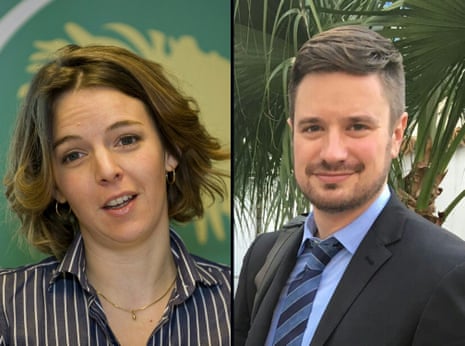The father of an American whose body was found in a shallow grave in the Democratic Republic of Congo last week has urged the Trump administration not to cut funding for the work for which his peacemaker son gave his life.
Professor John Sharp said his son Michael was a “warm-hearted” man who would never have taken risks or been reckless. The 34-year-old from Indiana was found dead along with Zaida Catalan from Sweden. Their Congolese interpreter Betu Tshintela and three motorbike drivers who were with them remain missing.
Part of the UN group of experts on Congo, Sharp and Catalan were investigating violence and alleged human rights violations by rebel militias when they were abducted on 12 March.
John Sharp said his family had last spoken to Michael just a few weeks before he went missing, as he was about to fly back to DRC after a trip home, to tell him he had become an uncle to a baby boy.
“We spoke to him at the time his younger sister had just given birth and as he was going back to the Congo from New York,” he said.
Sharp said his son, a Mennonite who embraced the “core conviction of peacemaking” that underpins his faith, would have taken all the necessary precautions in planning the fact-finding mission in and around Kananga, the country’s third largest city.
“Michael was meticulous, he followed protocol, he would have felt very responsible for the people working with him so he would have been doubly careful. Nothing about it would have been reckless.”
Sharp had been working in the country for five years and had joined the UN’s panel of experts following a stint with the Mennonite Central Committee in eastern Congo.
In his peace-building role for the religious organisation he became a leading expert on the armed group, the Democratic Forces for the Liberation of Rwanda.
Through church networks he built trust with commanders from the rebel group, negotiating the release of soldiers and offering them paths to repatriation and demobilisation.
Catalan, his colleague, had left a promising political career in Sweden to join the panel as a humanitarian expert.
Described by friends in Goma as having a “passionate commitment to the truth”, the 36-year-old had previously worked in Afghanistan and Palestine and had extensive experience of conflict resolution and working in hostile environments.
Sharp, a bible teacher in Kansas, admitted it had at times been hard accepting his son would always live in dangerous places, but added: “We always supported him in the choices he made and we were not about to say that because of our fears he should not fulfil his passion.”
Paying tribute to his son, he said: “He had a great sense of irony and humour, could be the centre of a party and was a great story-teller. We often marvelled at his intellectual capacity combined with a warm-hearted compassion.”
He warned that if provision were not made to continue the type of specialist work Michael and his colleagues undertook in the region “it would double the tragedy and the loss”.
“I just hope the tragedy of these deaths will not be compounded by a lack of resolve to continue the peace-building work that the UN has been doing there. Further, I would hope the US government would pay its UN dues so their work can continue.”
The Trump administration has vowed to “reduce or end funding for international organisations whose missions do not substantially advance US foreign policy interests”.
US cuts will fall hard on the DRC, adding pressure to President Joseph Kabila’s government, which is presiding over an an increasingly chaotic landscape. The DRC’s UN mission is among the leading recipients of foreign aid globally.
Parts of the country, particularly the east, have suffered insecurity for decades but violence in Kasai is a new expansion of tensions.
The conflict has escalated since last August, when security forces killed militia leader Kamwina Nsapu. Clashes between government groups and rebel forces have claimed 400 civilian lives and forced 434,000 people from their homes.
The mounting violence included the beheadings of more than 40 police officers whose bodies were found towards the end of last month. On Tuesday, 13 new mass graves were discovered in central Congo, bringing the total to 23.
It is believed the UN investigators planned to research the structural organisation of the relatively new militia group and investigate allegations about the use of child fighters.
They had met with local people, government and military officials in Kananga before heading south of the city on motorbikes as part of plans to meet the militia group. It was then, in Dibaya territory, they went missing.
After villagers discovered their bodies in shallow graves near a river, a government official reported: “The woman was beheaded.”
The UN has launched an inquiry into the killings as the search continues for the three other Congolese nationals.

The NGO community has been left shaken by the deaths. Michael Sharp’s friend Rachel Sweet, of the Congo Research Group, said the deaths were unprecedented.
She said sources in Kananga claimed it would be unusual for Kamwina-Nsapu to kidnap people in this way, adding that it is not yet clear who is responsible.
“We have no clear proof in any given direction so we must wait for answers from the investigations team,” she said.
She added: “Michael is someone who at this moment would remind us of peace and not vengeance as the solution. Both he and Zaida would be the first to situate their own deaths within the broader context of what is happening in Congo.
“They would want us to organise the same effort to understand the deaths of all the hundreds of Congolese who have been killed, even just in the past few weeks since their kidnapping.”
